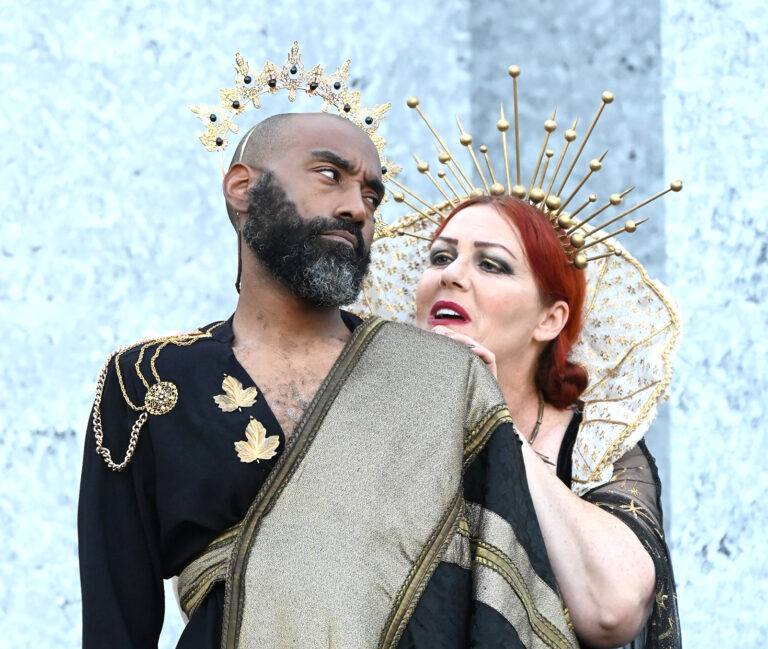

Roman Britain
While our play takes place in a “fantastical world” where Britain is under the control of the Roman Emperor Augustus Caesar, it was Claudius who invaded it in 43 CE. However, some tribes were already paying tribute as a result of Julius Caesar’s earlier raids. Cunobeline (or Cymbeline) was a Celtic king who was financially friendly with Rome and enjoyed its cultural exchanges, but it was his sons who decided to withhold tribute. The brothers were defeated in the invasion’s 2nd major battle, leading to the Romans gaining control of much of Southern Britain. Roman control was not absolute, though, as they experienced pushback from many groups in Britain, including Scottish tribes (hence Hadrian’s Wall) and the Icena, whose leader, Queen Boudicca, is an inspiration for the Queen in Cymbeline.
In terms of life under the Romans, there was a Roman governor in charge of what they called Britannia, but local governments were responsible for much of the administration. There was also much cultural assimilation: many Britons learned Latin, lived in Roman-style homes, and wore Roman clothes. The invasion also brought Roman slavery into Britain. In the beginning, the conquered Britons worshipped the Roman gods and goddesses (with some variations), as seen in the play, but became Christianized during Constantine I’s rule centuries later. Some Christian influence can be observed in Cymbeline, an example being Cymbeline’s ultimate decision to spare the defeated Roman soldiers. In the 5th century, Britain ceased to be a Roman territory, which left it vulnerable to invasion from the Saxons. It also gave the Celts an opportunity to reassert their culture once more.
There are some parallels between Cymbeline’s family and Augustus Caesar’s family. Both Cymbeline and Caesar were known to adopt family members but banish them as well. Augustus also had a daughter named Julia, who was once his heir. However, his wife, Livia, convinced him to adopt her son Tiberius as his heir, similar to what the Queen tried to do with her son Cloten. The disinherited Julia was ultimately banished from Rome.

Cymbeline was written by Shakespeare in 1610 during the reign of King James I, making it one of his later plays. After his coronation, James became the sponsor of Shakespeare’s theatre company, aptly renamed “The King’s Men”; this meant more financial support as well as expanded duties, including having to perform at court. Although he was a fan of theatre, James also gave in to Puritan pressures, closing theatres on Sundays and promoting publications that opposed cross-dressing (a prevalent dramatic practice during that period).
After James became king, many of Shakespeare’s works addressed aspects of his rule and his interests. The most obvious example of this is Macbeth, which discussed both his Scottish heritage and his study and fear of witchcraft. During his reign, James was also strongly in favor of unifying Scotland and England, advocating for it even when Parliament rejected unification in 1607. Politically, James referred to his realm as “Britain” and reasoned that “‘Great Britaine’ was ‘the true and ancient Name, which God and Time have imposed upon this Isle, extant, and received in Histories'”. This emphasis on unification and heritage is a significant theme in Cymbeline, which can be seen in the dynamic between Rome and Britain; in Act V, Cymbeline says “Let / A Roman and a British ensign wave / Friendly together”, a reference to James’ combining of England’s St. George’s Cross and Scotland’s St. Andrew’s Cross into the Union Flag in 1606. James also saw himself as the Caesar of his time: his ascension to the throne prevented many potential conflicts, replicating Caesar’s Pax Romana. Much of the language spoken by Cymbeline (and the Soothsayer in the original version) reflects this notion of peace. 1610 was also the year James’ heir Henry was named Prince of Wales, and the young prince was deeply interested in British roots, imperialism, and Protestantism; his death shortly after was seen as a tragedy for the nation. The setting of Milford Haven in Wales was perhaps chosen to honor Henry’s ancestor Henry Tudor, who landed in Milford on his way to fight Richard III. The Arden’s introduction of Cymbeline characterizes the play as moving in “two temporal directions at once”, a quote that very much applies to James and Henry’s aspirations. During James’ rule, there was also conflict regarding the Court of Wards (orphaned aristocratic children) and who should be responsible for their guardianship, an issue found in Posthumus’ story.
SAN FRANCISCO SHAKESPEARE FESTIVAL
PO Box 46093
San Francisco, CA 94146-0937
Stay Informed:
© 2025 San Francisco Shakespeare Festival, a 501c3 non-profit organization.